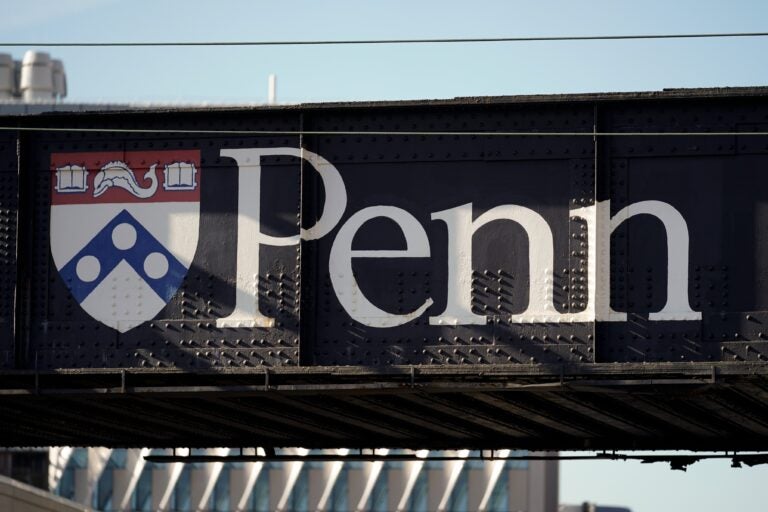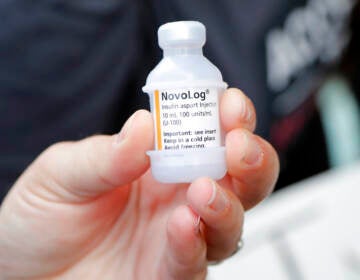University of Pennsylvania lawsuit alleges price-fixing by drugmakers and intermediaries have led to inflated insulin prices
Penn’s lawsuit against drugmakers joins hundreds of similar accusations. The defendants insist the charges are without merit.
Listen 1:32
A University of Pennsylvania sign is seen in Philadelphia, Friday, Dec. 15, 2023. (AP Photo/Matt Rourke)
From Philly and the Pa. suburbs to South Jersey and Delaware, what would you like WHYY News to cover? Let us know!
A lawsuit filed in federal court on behalf of the University of Pennsylvania and its health system alleges that 20 years of skyrocketing prices on drugs that treat diabetes, like insulin, can be blamed on price-fixing by the top U.S. drugmakers and Pharmacy Benefit Managers.
The pharmaceutical companies named as defendants in the lawsuit, filed July 11, are Eli Lilly, Novo Nordisk and Sanofi. They are accused in court papers of colluding with pharmacy benefit managers, or PBMs, including CVS Caremark, Express Scripts and OptumRX, to inflate prices over the years.
PBMs are intermediaries between drugmakers, insurers and pharmacies. The lawsuit alleges that they have misused this relationship in a complex scheme to keep prices high by colluding with the manufacturers.
Contacted by WHYY News, officials from Eli Lilly, Novo Nordisk, Sanofi, CVS CareMark and OptumRX all denied the charges.
Express Scripts did not respond to WHYY in time for publication.
A spokesperson for Penn said that it does not comment on litigation and would not make attorneys available.
The Penn lawsuit is one of many similar ones across the country.
Benjamin Widlanski, a partner in the firm of Kozyak Tropin and Throckmorton, represents the city of Philadelphia in similar allegations against the drugmakers and PMBs. It is among more than 400 lawsuits that have been consolidated before Judge Brian Martinotti in U.S. District Court of New Jersey in Newark.
They include states, cities, businesses, unions, universities and pension funds, Widlanski said.
“Over the last few decades, the PBMs have created a system that the manufacturers have actively participated in that has allowed them — both the PBMs and the manufacturers — to charge a lot more for insulin than they otherwise could,” Widlanski said. “The people who are paying for that insulin,whether that is uninsured individuals, whether that is insurance companies or self- funded plans who pay out of pocket for the insulin, they are being charged more than they should as a result of this scheme.”
According to Penn’s complaint, insulin costs manufacturers about $2 per dose to produce but reached levels between $300 and $700 per dose in the 1990s.
Court papers cite a U.S. Senate Finance Committee investigation that revealed that manufacturers’ price increases sometimes mirrored one another in days or even hours.
The complaint alleges PBMs “wield enormous control over drug prices and purchasing behavior.”
For Penn, there is much at stake. The university enrollment is about 87,000 students, and Penn Health System includes 49,000 faculty and staff. It is among the city’s top five employers.
In the U.S., about 38.4 million people — 11.6% of the population — suffered from some form of diabetes in 2024, according to the U.S. Centers for Disease Control and Prevention.
A Sanofi spokesperson said in a statement: “While we will not comment on the specifics of the allegations, Sanofi’s pricing practices have always complied with the law and the company is committed to helping patients access the medicine they need at the lowest price. Following through on that commitment requires Sanofi to navigate a complex environment. Under the current system, savings negotiated by health insurance companies and PBMs though rebates are not consistently passed through to patients in the form of lower co-pays or coinsurance. As a result, patients’ out-of-pocket costs continue to rise while the average net price of our insulin declines.”
A Novo Nordisk spokesperson issued this statement:
“Novo Nordisk believes that the allegations against it are meritless and we intend to vigorously defend against these claims. While we will not comment further about pending litigation, we recognize that not all patient situations are the same and we have a number of different insulin affordability offerings available through NovoCare. Importantly, we continue to review and revise our offerings as well as work with diverse stakeholders to create solutions for differing patient needs.”
This statement was issued by an Eli Lilly spokesperson: “These copycat lawsuits are baseless. In only three cases where insulin pricing allegations have been put to their proof, the plaintiffs have either dropped their case, lost their motion to proceed as a class action, or settled for no money. These outcomes speak for themselves.”
Issac Sorensen, a spokesperson for Optum RX, a unit of United Healthcare, said: “This baseless action demonstrates a profound misunderstanding of how drug pricing works. For many years, Optum Rx has aggressively and successfully negotiated with drug manufacturers and taken additional actions to lower prescription insulin costs for our health plan customers and their members, who now pay an average of less than $18 per month for insulin. PBMs, like Optum Rx, are the key counterweight to pharmaceutical companies’ otherwise unchecked monopoly power to set and raise drug prices.’’
Phillip Blando, a spokesman for CVS Caremark, said: “Pharmaceutical companies alone are responsible for the prices they set in the marketplace for the products they manufacture. Nothing in our agreements prevents the drug manufacturers from lowering the prices of their insulin products and we would welcome such an action. Allegations that we play any role in determining the prices charged by manufacturers for their products are false, and we intend to vigorously defend against this baseless suit. CVS Caremark has led the way in driving down the cost of insulin for all patients.”

Get daily updates from WHYY News!
WHYY is your source for fact-based, in-depth journalism and information. As a nonprofit organization, we rely on financial support from readers like you. Please give today.







